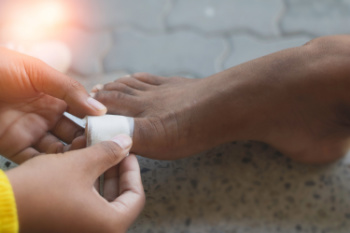
Blisters on the feet occur when fluid accumulates between layers of skin, often as a response to friction or pressure. Repeated rubbing from poorly fitting shoes or intense activity can irritate the skin, leading to the formation of these protective fluid-filled sacs. Blisters on the feet may also arise from burns, extreme cold, or medical conditions like eczema or diabetic neuropathy. Depending on the cause, blisters can be painfu, making walking difficult. It is not recommended to pop blisters yourself as this may lead to infection, which may require medical attention. A podiatrist can safely assess and treat foot blisters, especially those that are recurring or linked to underlying health issues. This foot doctor can drain the blister under sterile conditions, recommend footwear modifications, and address infections as needed. Professional care also reduces the risk of complications, such as worsening pain or more serious infections. If you have a problematic foot blister, it is suggested that you schedule an appointment with a podiatrist for safe treatment.
Blisters are prone to making everyday activities extremely uncomfortable. If your feet are hurting, contact Gerard Skaziak, DPM of Lakeview Family Foot Care. Our doctor can provide the care you need to keep you pain-free and on your feet.
Foot Blisters
Foot blisters develop as a result of constantly wearing tight or ill-fitting footwear. This happens due to the constant rubbing from the shoe, which can often lead to pain.
What Are Foot Blisters?
A foot blister is a small fluid-filled pocket that forms on the upper-most layer of the skin. Blisters are filled with clear fluid and can lead to blood drainage or pus if the area becomes infected.
How Do Blisters Form?
Blisters on the feet are often the result of constant friction of skin and material, usually by shoe rubbing. Walking in sandals, boots, or shoes that don’t fit properly for long periods of time can result in a blister. Having consistent foot moisture and humidity can easily lead to blister formation.
Prevention & Treatment
It is important to properly care for the affected area in order to prevent infection and ease the pain. Do not lance the blister and use a Band-Aid to provide pain relief. Also, be sure to keep your feet dry and wear proper fitting shoes. If you see blood or pus in a blister, seek assistance from a podiatrist.
If you have any questions, please feel free to contact our offices located in Guntersville and Albertville, AL . We offer the newest diagnostic and treatment technologies for all your foot care needs.
